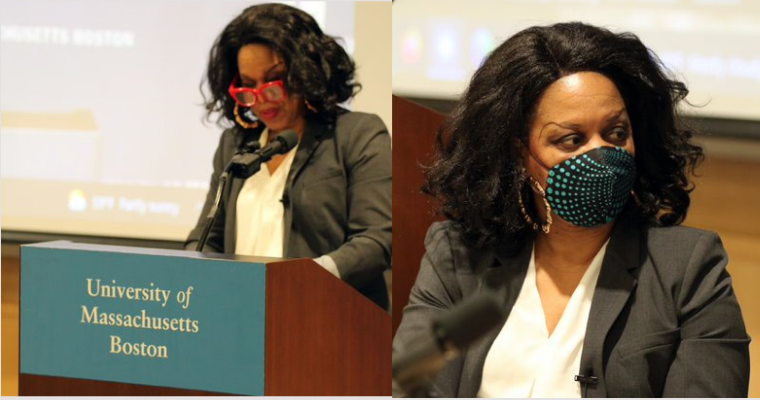A Year of Public Affairs: The Importance of Public Service at the McCormack School
For our academic mission at the John W. McCormack School of Policy and Global Studies, public engagement describes the myriad of ways in which the activity and benefits of higher education and research can be shared with the public through a public service mandate.

“ Public affairs schools, public sector, civic groups, and governments can work together to address common challenges ”
We’ve made public service and community engagement the hallmark of our activities this year. As we navigate the ebbs and flows of a persistent pandemic this semester, our sense of “we,” collectivity, and public interest have helped us reflect on what it means to be public service intellectuals and practitioners. As illustrated through the COVID pandemic, today’s world continues to produce many wicked problems. To this end, at McCormack, we premise our work on the belief that private and public sectors, civic groups, and governments can work together to identify and address common challenges in ways that build a stronger public community.
At the height of the Omicron crisis in January, we began our semester marking our public service mission to serve our communities through Martin Luther King Jr.’s birthday as a National Day of Service. When classes began at the end of the month, to showcase the outreach dimensions of our educational mission, we launched our MIIPS (McCormack Institutes of International and Public Service) Brown Bag series. Through our Brown Bag seminars, we revealed how our centers and institutes are critical to our public service mission. They act as a bridge to a worldwide community of connections and partnerships with public and private institutions that create meaningful intellectual and experiential exchanges for our faculty and students. That’s why the MIIPS brown bags—featuring our Moakley Chair Padraig O’Malley, our Collins Center Director, Mike Ward, and our Leading Age/LTSS Director, Marc Cohen—all provided our students with an opportunity to engage community partners in the process of co-creating knowledge in a variety of forms.
In March of this semester, we were again reminded and inspired by the public service mission embodied in our educational fabric when this year’s Robert C. Wood Professorship brought another distinguished public leader to campus for a lecture and conversation to engage students, faculty, and community members in discussions of public policy and public service: Dr. Ashish Jha. Now the former Dean of Brown University’s School of Public Health and currently President Biden’s pick to be the new COVID czar, Jha’s talk, “The Role of Public Service in Transitioning to a Post-COVID Era,” embodied our mission of public service in his own dual role as both a public servant and a public intellectual.
At McCormack, our commitment to public service and engagement extends beyond our campus and immediate Greater Boston and Massachusetts communities. Public engagement is international. Recognizing the policy impact that the global pandemic has had all over the world, we hosted this year’s Africa Day with the theme “From Pandemics to Endemics: Year 3, Public Health, and Covid 19 in Africa.” Our keynote speaker at that event, Her Excellency Hilda Suka-Mafudze, is the Ambassador and Permanent Representative of the African Union to the United States of America. Ambassador Suka-Mafudze’s core mandate is one of diplomatic public service, as she strives to enhance and maintain existing bilateral ties between the African continent and the United States by strengthening democratic institutions, trade and investment, and peace and security.
The current edition of McCormack’s newsletter provides more elaborate details about McCormack’s critical role and activities in public service this semester. Whether it is through the research of our stellar professors and applied research directors—Jan Mutchler and Maria Ivanova—the experiential learning of our students and fellows—Balkissa Daouda Diallo, Madhawa Palihapitiya, and Jack Sherman—the public service work of our staff and alum, Christopher Graham, or the service philanthropy of our donors like Nick Nyhan, our articles in this edition will reveal the diverse and manifold ways that our academic programs and co-curriculars connect the public policy theory that we teach and learn to real-world practices and impacts in our communities. In doing so, we continue to be committed to training McCormack scholars to respond to contemporary challenges around the world.
For our next and final newsletter this year, coming out in June, consider: “Does Democracy Protect Freedom?”, “Is there a Public Interest?”, “Paths to Public Service Careers with Rep Jon Santiago”, and “McCormack Speaks at WUMB Radio”; watch out for these headline stories, where we will continue to showcase our important work at McCormack through the lenses of public service and public engagement.